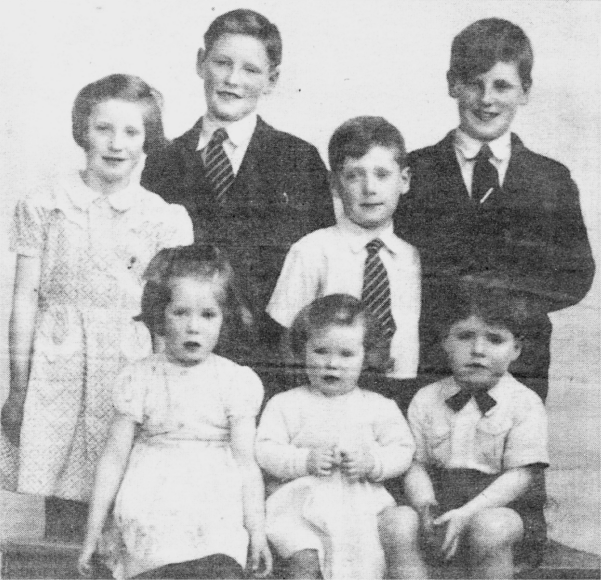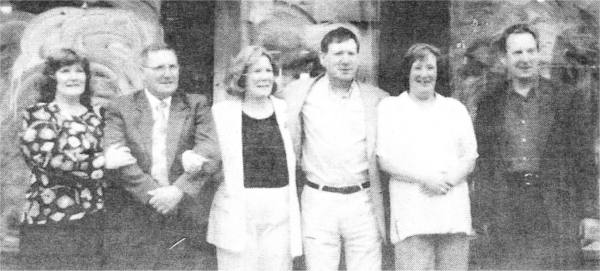|

Lily and
Samuel Dugan seven children
in the 1950's when they
lived at 3 Chapel Hill -
George, Seymour, Olwyn.
Samuel, Carol. Wilson and
Mavis.
LIVINGSTONE'S Ice Cream Shop; Ada Weir's Sweet Shop; Tom
Crossey's Shoe Shop all of these businesses were household names
in Lisburn during the 1950's and no more so than in the family
dwellings on Chapel Hill amongst which they were located.
Sadly, these shops have gone - just as many of the families
traditionally associated with Chapel Hill no longer live there.
The tight knit community which half a century ago existed in
the shadow of St. Patrick's Church, gradually disintegrated as
people moved away.
Some went to new houses being built on the town's outskirts
while others started new lives much further from home.
Today, the magnificent sandstone edifice of St. Patrick's is
one of the few aspects of Chapel Hill which has changed little
during the past five decades although the interior of this
historic place of worship was altered several years ago.
During the 1950's the church and its tall spire were very
much part of everyday life for young Samuel Dugan who lived at
3, Chapel Hill with his six siblings and their parents Lily and
Samuel (Senior).
He remembers St. Patrick's vaulted interior, presided over at
the time by long serving Parish Priest Canon Thomas H. McAuley
as being a place where you weren't allowed to run around'.
Samuel knew many of the pupils who attended the Catholic boys
school beside 'St. Joseph's big hall'. However, he was educated
at Central School on nearby Hillsborough Road.
His first experience of tragedy came early in life: Our Mums
didn't take us to school because it wasn't cool. But a boy in my
class was killed crossing the road. It was very sad," he
explained.
Samuel said during his formative years Chapel Hill was
regarded as ending at the 'golf links gate' while the bottom
boundary was extended to include Jenny Black's, shop he said
this sold 'all sorts of bats and balls, bamboo sticks, peeries
and spinning tops, hoola hoops and fishing nets.
The Dugan family home was located close to Jenny Black's
between R and D Thompson's Grocery Store and a plumber's shop
with gas mantles children 'didn't dare' touch.
Next came a second hand shop run by James and Mary Gilmore,
Ada Weir's famous sweet shop and Lavery's Bar where Samuel
frequently witnessed a 'strange ritual' on Sundays.
This involved men standing on the opposite side of the street
and going 'on patrol', possibly as far as the Antrim Street and
Smithfield Corners.
"I only learned years later they were called in one at a time
according to their pecking order, for a Sunday drink. The
pecking order was decided according to how well they behaved
when they were drunk," he added.
Police visited the bar one Sunday with officers setting a
trap for the drinkers by waiting at the rear of the premises
while someone else knocked on the front door.
Samuel's father was in the bar when this happened but quick
thinking meant he was not among those whose names appeared in
print: "My Dad was cute. He walked in td the kitchen and said he
was fixing a tap," he added.
Lavery's was adjoined by Hanna's Bicycle Shop 'where Gerald
put on bicycle tyres with his thumbs'.
At Crosseys new shoes always 'came with a scold'. Samuel said
this meant he never climbed walls or trees 'for about a day and
a half' after getting new footwear.
Haddens Yard had a 'no trespassing' sign but he and his
friends had to climb the wall because they played football in
Dan Mooney's pub yard.
"I was barred for breaking a window but Margaret brought me
back. I didn't deliberately break it," he added.
Samuel can remember standing on the footpath in Chapel Hill
waving as the Queen drove past during a visit to the area.
He can also remember Nora and Pauline, the nieces of Miss
Johnston who owned a very popular sweet shop as well as the
arrival of Paddy Hague who moved to Lisburn from Cavan and
opened a pub destined to become one of the best known in the
town.
"Chapel Hill has changed. Nowhere stays the same. The houses
are mostly gone and families have moved on," he said.
"But I won't forget the games we played and won't forget the
names of the other people who lived there - Flynn, Thompson,
Mooney, Rooney, Gilmore, Bradley, Burns, Lavery, Laverty, Weir,
Smith, Coburn, McGurnaghan and Murnaghan.
"There was also Crossey, Hadden, Hanna and Dorrian. I may
have moved away but as far as I'm concerned I come from Chapel
Hill and I always will."

The Dugan offspring outside their former home several years
ago. Sadly. George had passed away by the time this picture was
taken.
neil.greenlees@jpress.co.uk Ulster Star
21/03/2008
 |